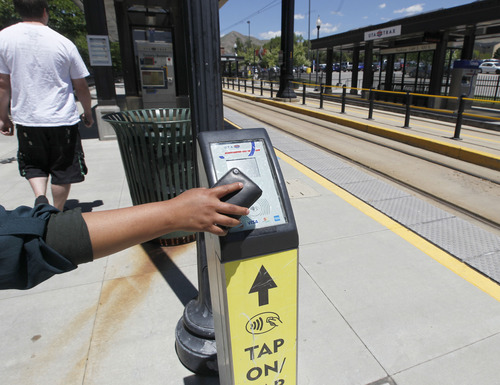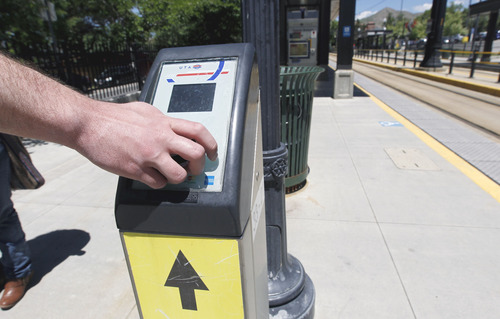This is an archived article that was published on sltrib.com in 2013, and information in the article may be outdated. It is provided only for personal research purposes and may not be reprinted.
University of Utah student Ryan Erfert is in a hurry as he exits a TRAX train near the campus stadium, but he fishes out his transit pass and "taps off" at an electronic reader. But many other students rush past him, skipping that step to save time.
"It just takes a second, and it helps make sure the university is charged the right amount for travel by its students" who use passes, Erfert says, when asked why he tapped off.
Utah Transit Authority officials wish they could persuade more riders to think that way. But UTA data requested by The Salt Lake Tribune show that nearly a quarter of pass holders during the past year did not bother to "tap off" after "tapping on."
That wreaks havoc with UTA planning.
Jerry Van Wie, UTA manager of fares, explains that if passengers with passes "tap on" at the beginning of a trip and "tap off" at the end as rules require, the agency can track how many people are traveling between certain points and when, and also figure where they are transferring.
"Not that we are tracking anybody, but we are looking for aggregate travel patterns," he says.
—
Planning • That information allows UTA to cancel or rework routes that are little used — and change routes between popular points to reduce travel time and transfers.
But it doesn't work if people don't tap off — and 23 percent of pass holders over the past year did not. That may be because UTA Police, using electronic readers on buses and trains, can ticket pass holders who do not "tap on." But those who do not tap off rarely face punishment.
"If they don't 'tap off' and just 'tap on,' then it is just giving us a count" of how many people get on at a certain point "instead of understanding where they are actually going," Van Wie said.
And whenever UTA changes schedules, some riders complain that UTA just doesn't understand how changes hurt many of them. If true, the many riders who don't "tap off" likely share the blame.
—
Electronic passes • Van Wie notes that about half of all current UTA riders use "tap on, tap off" passes from universities or larger employers such as the state government or the LDS Church — or electronic media tied to a credit card. UTA is moving toward a distance-based fare system that eventually will allow it to track such information about all riders.
Van Wie said that last year, UTA Police stepped up enforcing taps — with riders facing up to a $157 fine if they did not tap on. "We saw a pretty significant increase in compliance," he said.
Jacob Saunders, a U. employee who tapped off at the Stadium Station, said he does so mostly to avoid such fines. "I know they can use readers to tell if you have tapped on and off."
For some riders, there are also financial incentives for tapping off, said Van Wie. Passengers who use electronic media, such as tap-on smartphone apps tied to credit cards, lose a $2.50 credit if they start a trip on a bus but fail to tap off as they transfer to a train or another bus.
—
Big users • UTA is also working with some of its larger purchasers of passes to educate and encourage people to tap off, including offering contests and prizes for those who comply.
Alma Allred, director of commuter services at the U. — which happens to be the single largest purchaser of UTA passes — says it has a contest to give away an iPad each month during fall and winter semesters.
"We choose a commuter of the month. They have to tap on and tap off each time they ride. If they have traveled 10 times during the month, they are eligible for a random drawing that we give each month," he said. "I'm not sure if it encourages more people to ride, but it encourages more people to tap on and off."
Allred says there's good reason for the U. to promote the activity. He notes the 43,000 students and staff at the U. are all eligible to ride UTA buses and trains with their ID, and about 9,000 do so daily — and he estimates 12,000 to 15,000 ride at least sometimes in any given month. The university pays about $3.2 million a year for that, providing about 8 percent of all UTA fare revenue.
"We negotiate each year for a price [for that transportation] with UTA. It is to both our benefit and theirs to find out exactly how many people are riding," he said.
Even though a quarter of pass holders still are not tapping off, Van Wie said, "We're happy it's as high as it is." He said he believes the three-quarters who do tap off "understand that it helps us improve our service and make needed adjustments. That benefits them, so I think a lot of folks just get it."





